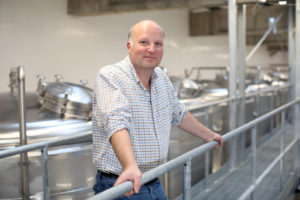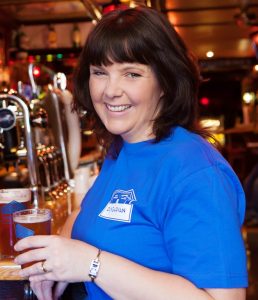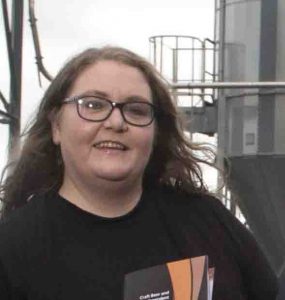Craft Brewing & the Coronavirus lockdown

How has the drop in demand affected the country’s craft brewers and what lockdown strategies have they in place to counter the drop in business and what plans they have for when all this is over?
Ireland has some 70 craft breweries at present. And as in every other country in the world, those of our craft breweries with most reliance on the on-trade find themselves the most severely affected by this Coronavirus lockdown – but by the same token, should they survive, they could just be the very ones to benefit from the groundswell of local support when this is all over.
The on-trade channels 55% of total alcohol sales in this country to the consumer but with its closure due to Covid-19, “…as expected, we’ve seen a rise in off-trade sales” points out Drinks Ireland, “but this increase in no way compensates for the loss in sales associated with the on-trade being closed”.
Drinks Ireland Director Patricia Callan estimates that overall alcohol consumption in Ireland could be down by around 30%.
So just how has drop in demand affected the country’s craft brewers and what lockdown strategies have they in place to counter the drop in business and what plans they have for when all this is over?
Carlow Brewing Co – “readying ourselves for the long haul”

Seamus O’Hara – Most of his staff have been retained on a part-time basis.
Naturally the Carlow Brewing Company has had to downsize to get its costs in line with the drop-off in on-trade business caused by the Coronavirus.
But its founder and proprietor Seamus O’Hara fingers in a few different pies aside from craft brewing.
For example he owns the Urban Brewing outlet in Dublin’s CHQ Building as well as running Brewery Corner, his own pub in Kilkenny, which he runs with his wife.
Like everybody else, his businesses have been hit.
But his Urban Brewing outfit continues to operate a takeaway service for food and beverage.
“It’s very small compared to being fully open but it allows a little activity to go on and for us to keep some of our core team involved,” he says.
Most of his staff have been retained on a part-time basis.
“We want to make sure we try and keep as much of the team together as possible by adopting appropriate work practices and the same in our supply businesses that are still going in the off-trade.”
His on-trade business has naturally disappeared, “… or maybe not disappeared but paused…” while the off-trade continues in both the domestic market and the export market (which “ebbs and flows”).
“Most of our business here is now focused on the off-trade. We’ve seen the off-trade channel continue, a bit choppily on the export side, but we envisage most of our customers continuing.”
He’d describe his domestic off-trade market overall as “pretty strong by-and-large” with his sales figures being in line with the generally reported uplift in off-trade sales which, over the four week period to the 12th April, grew 57% versus the same period last year according to Nielsen.
Brewery precautions
A lot of sanitisation and cleaning work would normally be carried out at the brewery so those same principles remain in place during the lockdown there.
Where possible, people now work from home.
“But for people on site we’re tried to keep them in their different separate departments,” he explains. Staff now work out of three separate structures at Carlow Brewing, overseeing production, office work and warehousing.
“We’ve tried to enhance this by minimising interaction, contact and mixing of people,” he adds, “There’s no overlapping of shifts any more in order that we’ve the minimum possible number of people on site to help maintain social distancing.”
With suppliers coming into the brewery, procedures put in place ensure no unnecessary contact here either.
“We want to run a sustainable operation so that whether this lasts for a month or six months we can continue” says Seamus, “as I think it will take quite some time to build back to where we were and I recognise the challenges for our on-trade customers, so recovery is going to be gradual.
“We’re readying ourselves for the long haul here and hope to have something in reserve, to work with our customers and build back the business.”
In the meantime Seamus tries to keep in touch with his on-trade customers but until there’s more guidance from the Government it’s hard to speculate further.
So he’s none too optimistic as to when the on-trade will get to open again.
“There’s also the challenge of opening with limited capacity, so he envisages a slow re-opening, step-by-step.
But Urban Brewing finds itself reasonably well-placed in having a fairly large premises to work from so it’s all the more possible to adhere to whatever restrictions apply and just be ready for when it happens with a plan to make it work.
Porterhouse Brew Company – “it’s just a case of keeping ourselves out there”

“Obviously, with the closure of bars here and in the UK as well as in Europe and the US, it has hit us quite severely” – Peter Mosley.
Up in Dublin the Porterhouse Brew Company’s bottled beers sell fairly steadily says Head Brewer Peter Mosley, “It’s not paying all the bills but sales are improving. For us it’s just a case of keeping ourselves out there. If we don’t keep up a presence on the market people will just forget about us.”
Of course the brewery has cut back production “massively” – by some 90%, according to Peter, “Primarily for us, the majority of our beer has always been draught,” he says “Obviously, with the closure of bars here and in the UK as well as in Europe and the US, it has hit us quite severely.
“But we’ve had the product in bottled format now for quite some time and so we’re concentrating on selling our bottled beers.”
Thus the company supplies the supermarkets, off-licences and wholesalers via its own distributor Grand Cru Beers.
“When this all broke around St Patrick’s Day we were very well-stocked with draught & bottled product and so we began moving product where we could from draught into bottle,” he recalls.
The brewery diverted one brand in particular into bottles which has now become Stay Home IPA – all the proceeds from which go to the ‘Feed The Heroes’ charity.
Porterhouse Brew Company also hopes to launch a range of canned beers in next few weeks.
Getting back to ‘normal’
For Peter, everything depends on when the restrictions on pubs can be lifted.
“If they’re not lifted soon, it will be very challenging; it’s going to be a bit of a long slog until it’s all over.”
In the meantime the Porterhouse is examining the possibility of supplying take-home beer in draught format….
Dungarvan Brewing Company – “by supporting each other we will hopefully all come through this with as few wounds as possible”

“By supporting each other we will hopefully all come through this with as few wounds as possible” – Claire Dalton.
Dungarvan Brewing Company in County Waterford ceased production totally in mid-March on the initial school closure announcement.
“We actually had a good amount of stock in the brewery at that time as we were gearing up for St Patrick’s weekend, Easter and the general start of the tourist season,” recalls Claire Dalton, Marketing Director & one of the Co-Founders there, “ Cormac O’Dwyer and I have been mostly working from home since then, although going in to pack up orders and organise deliveries etc.”
Since lockdown began, Claire can report that a lot of housekeeping, particularly in terms of accounts, has been caught up on.
“We initially contacted all our direct customers and arranged collections of stock, kegs etc and spoke to our wholesalers in terms of the customers they service,” she explains, “Pretty much all of our draught beer is sold locally to us so we were able to engage directly with those customers. We also had to contact everyone who had a tour booking and make arrangements for refunds or rescheduling of those. We then started engaging with the bank and our suppliers etc to see what we could do in terms of cashflow and have been working through getting everything up to date. We’ve also been dealing with our Local Enterprise Office and Bord Bia on supports as well as attending webinars with them and we’ve had some Zoom meetings with our Independent Craft Brewers of Ireland colleagues, sharing information and working together on different campaigns.
“Our wholesaler Fourcorners is still in full operation and getting our beers out to off-licences nationwide which is great for us. We also have some local accounts who we’re getting deliveries to as well – we got the message out immediately that although we were closed for production we’ve plenty of stock and still delivering. Now that things have settled out a little in the market we’re actively working with Fourcorners on anticipating sales so that we’ll be ready for when the time comes to begin brewing again.”
Online sales
Dungarvan placed its beer sales online initially as a local service in late March but had never tried online beer sales before this.
“Originally, we’d an online shop for tour bookings and merchandise only,” says Claire, “Due to being wholesale licensed we have to adhere to minimum order quantities.”
So Dungarvan Brewing added a nationwide service using couriers at the beginning of April following a few requests on its social media accounts and has been pleased with the take-up on it.
“We know that the three-case minimum order is a big ask” she says, “so we weren’t sure how much sales we would have through the online shop but people have really engaged, especially as a show of support to the brewery and it has been a welcome source of income and hopefully we’ve gained some new customers drinking our beer from it!”
As this uncertain period progresses Clair thinks that they’ll be revisiting and reviewing how they do everything as well as introducing more social distancing measures in the production and general business side.
“Packaging options and more will all need to be looked at,” she says, “I’m not sure if tours will be feasible in the future so that side of things may be stopped altogether and certainly for the coming season”.
In the middle of this marketing maelstrom she has noticed a definite shift towards supporting local and small producers for both food and drink and she’d like to think that will continue on, “…as it’s hard to know when pubs and restaurants will be back up and running and what measures they will need to take to do so safely; I can see a shift towards the takeaway model where we’ll be collecting both food and a growler of good beer to bring the dining experience home with us.
“It’s a really tough time for all small producers and business owners and it’s been great to have the support of others, especially other brewery owners who we’ve been able to chat to, share our problems with, lend an ear when needs be and have as our support system.
“The Irish Craft Brewers of Ireland has also been a huge support in this time and possibly really comes into its own as showing the value of working together as an industry and helping each other out. By supporting each other we will hopefully all come through this with as few wounds as possible.”
Independent Craft Brewers of Ireland – “The mood is fairly grim from a business perspective”

“I’d estimate that those few experiencing the Best Case scenario are nonetheless experiencing a minimum drop of 50%” – Elisabeth Ryan.
Someone with her finger on the pulse of craft brewing countrywide, Elisabeth Ryan of the Independent Craft Brewers of Ireland, finds that what ICBI members do during this hiatus in production varies widely.
For breweries across the board the first step involved looking after their staff as far as possible, she says, adding, “Nearly all have had to let a large proportion of their staff go temporarily. Some have availed of the income support scheme, others have had to close and both themselves and their staff are availing of the unemployment payment in place.
“Next immediate steps were negotiating with excise to defer duty payments and maintain cashflow, engagement with lenders, councils, landlords and insurance companies to try and negotiate extensions.
“Much of this work is ongoing. On a practical level, tanks had to be emptied into bottles or cans and plans put in place for sales and distribution of same where possible.
“All breweries are planning for dealing with returned kegs and disposal and are looking at putting re-start systems and plans in place. However this sort of planning will involve a number of different scenarios depending on the timeline.
“Many members have used this time for maintenance and repairs and of course getting through all the tedium of paperwork catch-up,” she says, “Some, who had or have developed a good customer base for canned and bottled beers, have not experienced quite as significant the ‘near to/close to’ shutdown or indeed total shutdown situation experienced by others.
“I’d estimate that those few experiencing the Best Case scenario are nonetheless experiencing a minimum drop of 50%; others have temporarily closed and others again have dropped down to around 10% of their normal sales.
“Very few microbreweries are now regularly brewing. Existing tanks were used to fill bottles and cans.”
In some cases her members retain a route to market, “However” she claims, “it’s widely reported that multiple retailers are reducing shelf space for local independent products in favour of fast-moving multinational brands. This is right across the food and drinks sector.
“Export demand has, of course, also largely fallen away.
“Wholesalers/distributors with multiple and independent retail clients are still operating largely as normal.
“Those who already had routes to market in place nationally for off-sales have largely retained these.”
Online
One craft beer company in the UK, Jubel, reports online orders up by 1,400% since the start of lockdown there.
Here though, online sales prove difficult for some craft breweries due to licencing laws. These breweries’ manufacturing licence specifies that direct sales must be at wholesale quantities equating to approximately three cases of beer (36 x 500ml).
“However” explains Elisabeth, “some members have different licences – those who maybe have brewpubs for example – which allow them to sell online or else have grouped together from a single distribution point with a brewpub for online sales or have kept with their regular online sales clients,” she says, “Many have developed new routes to market by combining resources online, for example beercloud, or by promoting their off-licence customers that have online sales in place.
“There is indeed a significant increase in these types of sales, however we would not have any figures for same and even a massive increase would still be from such a low base level that it wouldn’t equate to more than 5% or 10% of original sales at very best.”
The ICBI has been in constant contact with its members and has worked to engage with government and various different bodies seeking both clarity and supports for the sector.
“The mood is fairly grim from a business perspective” says Elisabeth, “however it’s worth noting that independent craft brewers are a resilient and generally very positive bunch of people and as a community they’re coping well for now.”
A general view exists that even if pubs do re-open soon a large proportion of society will stay away – as such, currently, she finds it difficult to see any prospect of recovery even in the medium-term.
So the ICBI now finds itself examining various options for future different business models based on vastly reduced on-trade sales.
“It would be difficult to imagine that all breweries will emerge on the other side,” she admits, “Obviously no one has a crystal ball, so much of the speculation will be dependent on government policies moving forward.”
With this prospect she reckons that the Tourism industry can consider itself “wiped out” until a vaccine is found.
“There’s little hope of a return to business-as-usual operations in the next 18 months to two years,” she believes, “At that stage the worldwide economic downturn will take much more time to recover and as such a positive outcome and return to previous sales levels is going to take well over three years. As with breweries, it will be difficult to see all of the pubs, restaurants and hotels making it through to the other side of this crisis.
“New models of operation will need to be fleshed-out and whether they will be sustainable will depend on what happens over the coming months.”









